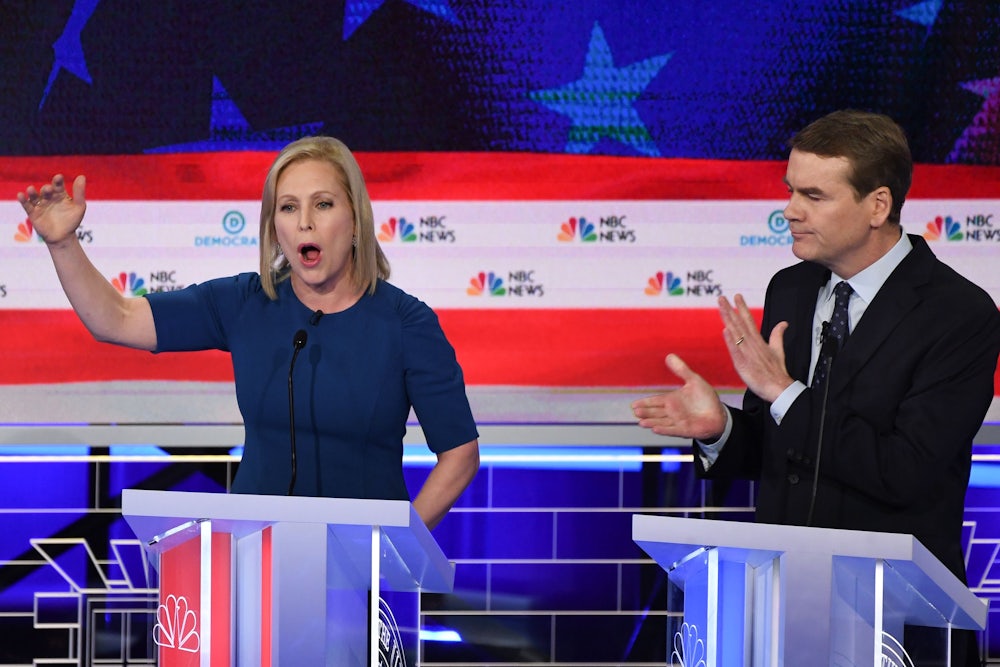Hours before Thursday’s Democratic presidential debate, the Supreme Court issued two rulings that could greatly affect our democracy. One decision failed to stop the drive toward increasingly partisan gerrymanders, and the other temporarily blocked the Trump Administration’s attempt to leverage the decennial United States Census for partisan advantage.
Despite this timely news peg, the debate moderators failed to ask a single question about the state of American democracy. This oversight is particularly egregious given that voter suppression, the deluge of big money in politics, and the rigging of district lines has undeniably limited the Democratic Party’s success over the past decade.
Fortunately, a few candidates chose to integrate democracy reform into their talking points, even without the prompt. And if Democrats want to convince voters they are serious about enacting meaningful, progressive legislation, everyone, across the party, should learn from what was said during the debates. Above all else, these candidates articulated a realistic theory of change, one that made their policy proposals more believable and spoke to the sense of powerlessness most Americans feel today.
“We’ve heard a lot of good ideas on this stage tonight,” New York Senator Kirsten Gillibrand explained. “But the truth is, until you go to the root of the corruption, the money in politics, the fact that Washington is run by the special interests, you are never going to solve any of these problems.”
For Gillibrand, political inequality is the roadblock to reform. And mounting evidence suggests that this is indeed the case; the wealthy hold significant sway over politics whereas the rest of the population is virtually devoid of meaningful influence. If political power is democratized, the senator argued, “We can guarantee healthcare as a right, not a privilege. We can deal with institutional racism. We can take on income inequality, and we can take on the corporate corruption that runs Washington.” And to do this, she called for the public financing of elections.
While there are at least ten other candidates who have endorsed public financing, Gillibrand’s proposal is uniquely detailed and aggressive. Under her plan, every voter would receive up to $600 worth of vouchers to give to eligible federal candidates. Such a program would greatly increase the political power of ordinary Americans and lower the barrier to entry for political candidates without wealthy donor connections.
On Wednesday night, candidate Beto O’Rourke also made a strong case for how progressive change is predicated on democracy reform—though, unlike Gillibrand, he did not make this theme the through line of his debate performance.
“Right now, we have a system that favors those who can pay for access and outcomes,” the former Texas Congressman explained. O’Rourke intoned for “a new democracy that is revived because we have returned power to the people, no PACs, no gerrymandering, automatic and same-day voter registration to bring in more voters, and a new Voting Rights Act to get rid of the barriers that are in place now.” Only then, he explained, will all Americans have a voice in our democracy, and because of that, politicians will be motivated to make the economy work for everybody.
The centrality of democracy reform as a means of enacting change is not new. Such a message played a significant role in 2016 when Donald Trump, capitalizing on a sense among voters that the system is rigged, called out his Republican rivals for taking campaign contributions from the ultra-wealthy, while he took the stage to chants of “drain the swamp.”
But with economic and political inequality growing, the message in 2020 has only become more potent. Indeed, to ignore the feeling of political powerlessness is a major risk for Democrats. After all, there is no reason to believe that Trump will not run on a similar message this time around—no matter how hypocritical.
Moreover, as the Democrats move leftward on issues such as climate change and health care, the seriousness of the increasingly bold policies proposed—and the likelihood of their passage—is limited by a vision of how to get them enacted.
Five candidates—Buttigieg, Yang, Gillibrand, O’Rourke, and Williamson—have taken this reality to heart, publicly pledging to address democracy reform as their administration’s top priority.
On Thursday, Gillibrand, when talking about her public financing plan, reiterated this commitment (though, somewhat confusingly, pivoted to a family bill of rights when asked by Chuck Todd about her top priority). Pete Buttigieg did so as well.
Colorado Senator Michael Bennet—who recently released a strong democracy reform platform and pledged to make it central to his campaign—attempted to capitalize on this vision of change at the debate, too. Similarly, Senator Bernie Sanders lambasted the outsized influence of moneyed interests and used his closing statement to explain how no change is possible until Americans take on the major corporations.
But his solution to do so—namely, mass mobilization—only goes so far. Even a movement-based campaign will still be constrained by an unrepresentative system designed to stymie meaningful change.
If Sanders prioritized democracy reform in his political revolution, his theory of change would be more believable to those who have difficulty understanding his campaign’s biggest goals. Indeed, this small addendum to his messaging would be potent and serve as the best rebuttal to claims that his policy proposals—such as Medicare for All and eliminating student debt—are unrealistic.
The primary season is still in its early stages. There is plenty of time for candidates to hone their messages and present a clear theory of change—and to clearly detail how we can make it happen. Those theories should be big and bold, but they should also contain some simple truths that were once self-evident: Every voice should be heard, every person should be represented, and every citizen should get an unencumbered chance to vote. If this is done successfully, there’s a better chance Trump can be sent packing, along with many of the other swamp creatures.
